Why Did Mr Rogers Say He Was Feeding His Fish
It's been a beautiful month on the internet, as fans are celebrating Mister Rogers with touching stories and memories.
February marks 50 years since "Mister Rogers' Neighborhood" aired for the first time to a national TV audience.
In celebration of the series and its kindhearted lead, The Fred Rogers Company and fans have shared the ways in which Fred Rogers, who died in 2003, changed their lives for the better — from assuring kids that their differences are OK to reminding viewers to "look for the helpers" in times of crisis.
As with most anecdotes about the soft-spoken star, they're sure to make you smile and cry at the same time.
1. "You can never go down the drain"
When the Fred Rogers Company asked for stories about ways Rogers impacted fans, Facebook user Karen Betenbough shared how a segment on the show helped her daughter, then 2, overcome a fear of the bathtub.
"Whenever she had a bath, when I took the tub plug out she would scream and fight to get away and run as far as she could to get away from the tub," wrote Betenbough. "One day Mister Rogers had on his swimsuit and got in a bath tub...he put water in tub and talked to kids about how no one could go down the drain."
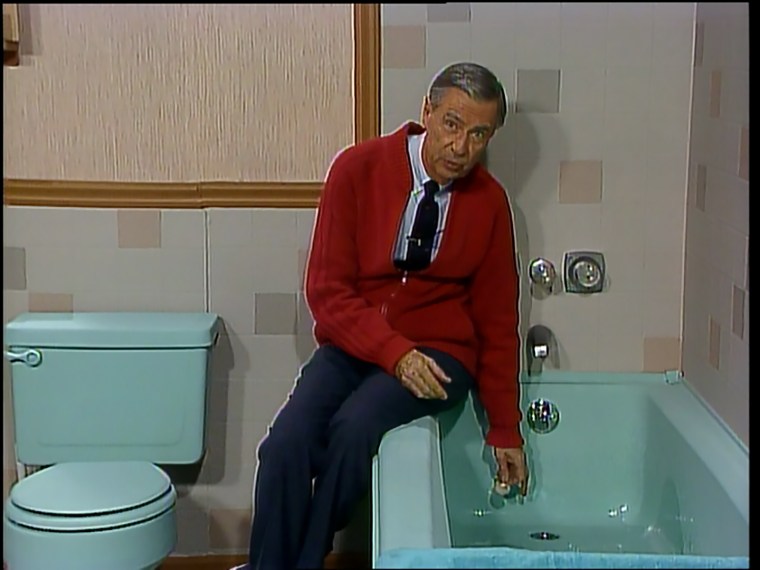
Betenbough says from that day forward, her daughter was no longer afraid to take a bath.
The Fred Rogers Company clarifies that while Rogers was seen in a swimsuit in a few episodes of the show, he was never shown in a swimsuit in the bathtub — though he did talk about drains and bathtubs in a few episodes. Mister Rogers also wrote a song called 'You Can Never Go Down the Drain,' and he sang it now and again on the program.
2. "He always welcomed me into his house"
In the same post by the Fred Rogers Company, Facebook user Wendy Roosevelt-D'angelo explained how, as a lonely child who was often bullied, Rogers was a special influence in her life.
"When Mister Rogers said goodbye at the end of each episode, tears would stream down my face," wrote Roosevelt-D'angelo. "I felt as if he was the only person who liked me and accepted me just as I was. I never met him, but he is one of the most precious friends I have ever had."
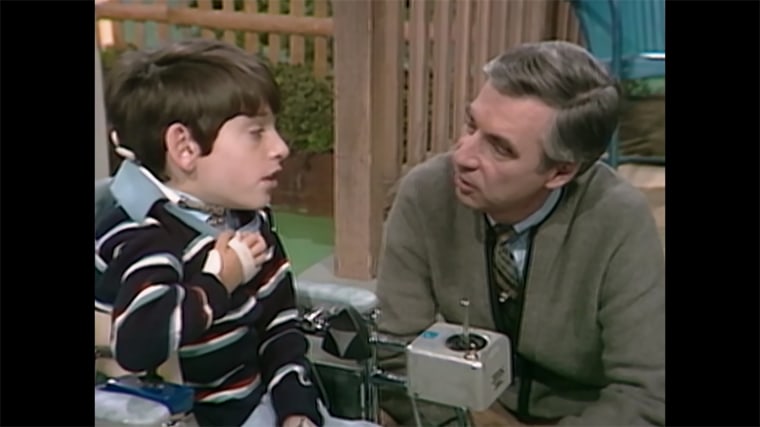
"My friends and family love to tease me about my lifelong love of Mister Rogers, but what he taught both children and adults about kindness and acceptance were lessons needed now more than ever," Roosevelt-D'angelo told TODAY Parents.
For more heartwarming parenting stories, follow TODAY Parents on Facebook
For first-generation American Premilla Vennela, Rogers was a great help throughout her childhood.
"He always made me feel welcome...I never felt like I fit in anywhere. But he always welcomed me into his house."
3. "I learned to speak English"
Emmy Beltre learned to speak English as a child by watching "Mister Rogers' Neighborhood" on his local public television station.
In the 1990's, Beltre moved from the Dominican Republic — where he spoke only Spanish — to the United States.

"I didn't know a lick of English and we had just moved here," Beltre, a senior graphic designer for WFIU Public Radio, told NPR. "Probably one of the greatest things that happened by watching Mister Rogers is that I learned to speak English."
Beltre credits Rogers' unique way of enunciating words, speaking slowly and pointing to objects to identify them with allowing him to start school, six months after moving, with the ability to speak English.
4. "My real friend, not just a TV friend"
In an essay on the TODAY Parenting Team, Beth Usher described a special relationship she shared with Mister Rogers.
As a small child, Usher had brain surgery to treat a debilitating brain disease which caused her to have over 100 seizures each day. After her mother placed a call to Mister Rogers' television studio asking for his autograph or a special note from him to encourage Usher before her surgery — in which the entire left hemisphere of her brain would be removed — Mister Rogers called her.
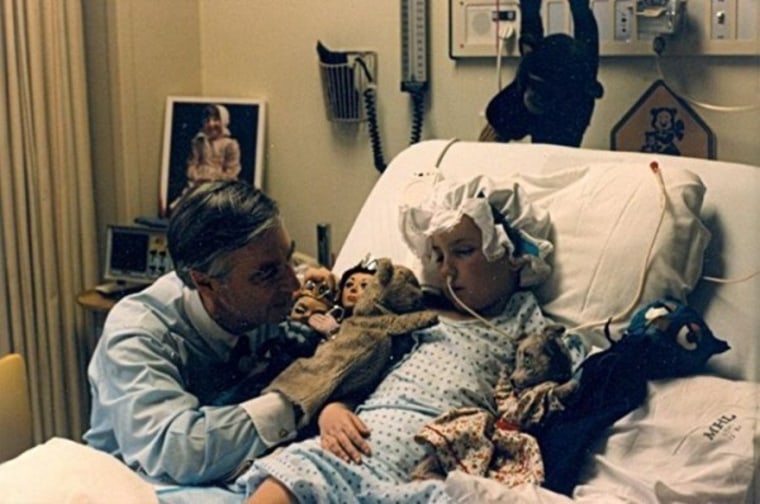
"Mister Rogers asked me about my brain surgery and I told him things that I did not even tell my parents," wrote Usher. "I told him that I was scared but wanted the seizures to go away. I told him that I wanted the kids in my class to like me and to play with me...we talked for nearly an hour. Before I hung up the phone, I said, 'I love you, Mister Rogers.'"
Rogers visited Usher in the hospital after her 12-hour surgery, while she was in a coma. He brought his puppets and spent several hours at her bedside.
"Mister Rogers became my real friend and not just a TV friend," wrote Usher. "We remained close and shared many conversations, birthday wishes and milestones for the following 20 years until his death."
5. "Please say when you are feeding your fish"
Model Chrissy Teigen tweeted one of her favorite stories.
"Mister Rogers would narrate himself feeding the fish each episode with 'I'm feeding the fish' because of a letter he received from a young blind girl who was worried the fish were hungry. Love you, Mister Rogers," read Teigen's tweet.
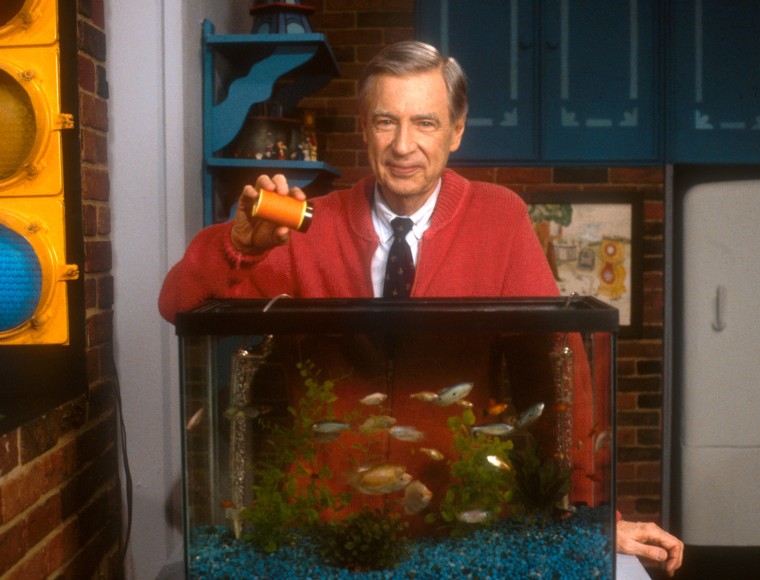
The fish story appears in "Dear Mister Rogers, Does it Ever Rain in Your Neighborhood?" a collection of letters received by Rogers from children throughout his career, and his replies. The book reads:
"One girl and her family wrote to tell us there was a special reason why she wanted me to talk about feeding the fish each day."
"Dear Mister Rogers, Please say when you are feeding your fish, because I worry about them. I can't see if you are feeding them, so please say you are feeding them out loud. Katie, age 5."
"(Father's note: Katie is blind, and she does cry if you don't say that you have fed the fish.)"
6. "He was helping me dry my feet"
Francois Clemmons — who played Officer Clemmons on Rogers' show — had the first recurring role for an African-American on children's TV.
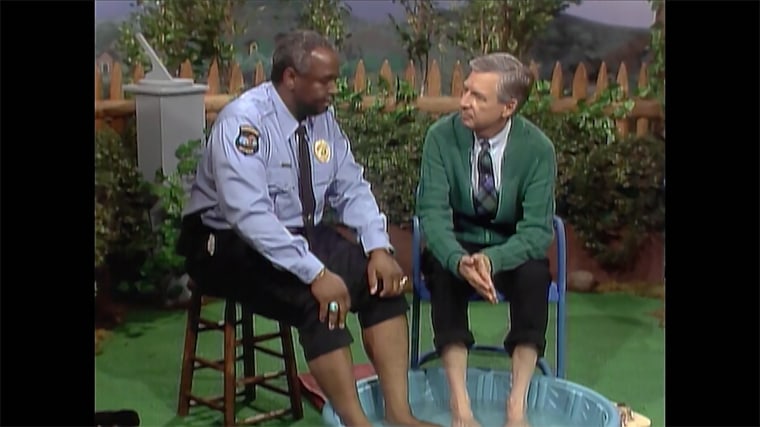
"There was one particular scene Fred and I did where he had his feet resting in this plastic pool on a hot day and he invited me to come over and rest my feet in the water with him," Clemmons told the NPR podcast "StoryCorps." "The icon Fred Rogers not only was showing my brown skin in the tub with his white skin, but as I was getting out of that tub, he was helping me dry my feet."
"I think he was making a very strong statement," Clemmons added about the episode, which aired in 1968. "And I discovered a friend for life."
Source: https://www.today.com/parents/6-touching-stories-about-mister-rogers-impact-fans-t124045#:~:text=Model%20Chrissy%20Teigen%20tweeted%20one,worried%20the%20fish%20were%20hungry.
0 Response to "Why Did Mr Rogers Say He Was Feeding His Fish"
Post a Comment